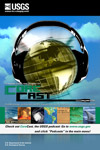USGS CoreCast
It's natural science from the inside out.
USGS Podcasts Home > CoreCast Home Page
Can't see Flash? Install Flash Player.
Next page
|
102
|

Mercury contamination was detected in every fish sampled in 291 streams across the country. About a quarter of these fish were found to contain mercury at levels exceeding the criterion for the protection of people who consume average amounts of fish, established by the U.S. Environmental Protection Agency. We talked to Lia Chasar, lead ecologist on the USGS study. (6:27) |
Transcript/Links | |
|
101
|

Most glaciers in Washington and Alaska are dramatically shrinking in response to a warming climate. USGS scientist Edward Josberger discusses research from the past 50 years to measure changes in the mass (length and thickness) of three glaciers in Alaska and Washington. These are the longest such records in North America and among the longest in the world. (5:05) |
Transcript/Links | |
|
100
|

It's Pollinator Week 2009, and we're talking to USGS scientist Sam Droege about the tremendous importance of native bees and pollinators in general, and how you can lend a hand to these tiny titans. Like eating fresh fruits and vegetables? Think agriculture is important to our society? Then you'll want to pay attention to this CoreCast. (11:00) |
Transcript/Links | |
|
99
|

Climate change is happening across the entire Nation and is projected to continue in the future with widespread impacts. (8:13) |
Transcript/Links | |
|
98
|

A roundup of the April and May 2009 hazard-related events around the world, with some newsworthy tidbits. (4:36) |
Transcript/Links | |
|
97
|

Man-made moon dirt, or regolith, has been created by the USGS to help NASA prepare for upcoming moon explorations. USGS scientist Steve Wilson talks about this "mission critical" project. Images are available in the Details/Transcript section as well as on the USGS Multimedia Gallery at: http://gallery.usgs.gov/collections/Astrogeology (5:00) |
Transcript/Links | |
|
96
|

Late on May 17, 2009, a magnitude 4.7 earthquake struck in the Greater Los Angeles area. We spoke with Ken Hudnut, a geophysicist with the U.S. Geological Survey to fill us in on the details. (6:05) |
Transcript/Links | |
|
95
|

USGS Geophysicist John Power discusses the recent flare up in earthquake activity at Mt. Redoubt and the likelihood of another eruption in the near future. (6:11) |
Transcript/Links | |
|
94
|

Climate change is increasing the mobility of sand dunes in the Southwest, posing threats to roadways, infrastructure, human health, cultural practices of the Navajo Nation, and much more. Vegetation on dunes serves as a stabilizer, but as the climate warms and precipitation decreases, there is less vegetation growth. USGS scientist Margaret Hiza and intern Leanna Begay discuss their research to understand the dunes' plant diversity and what changes are occurring. (8:47) |
Transcript/Links | |
|
93
|

A roundup of the March 2009 hazard-related events around the world, with some newsworthy tidbits. (3:25) |
Transcript/Links | |
Next page


